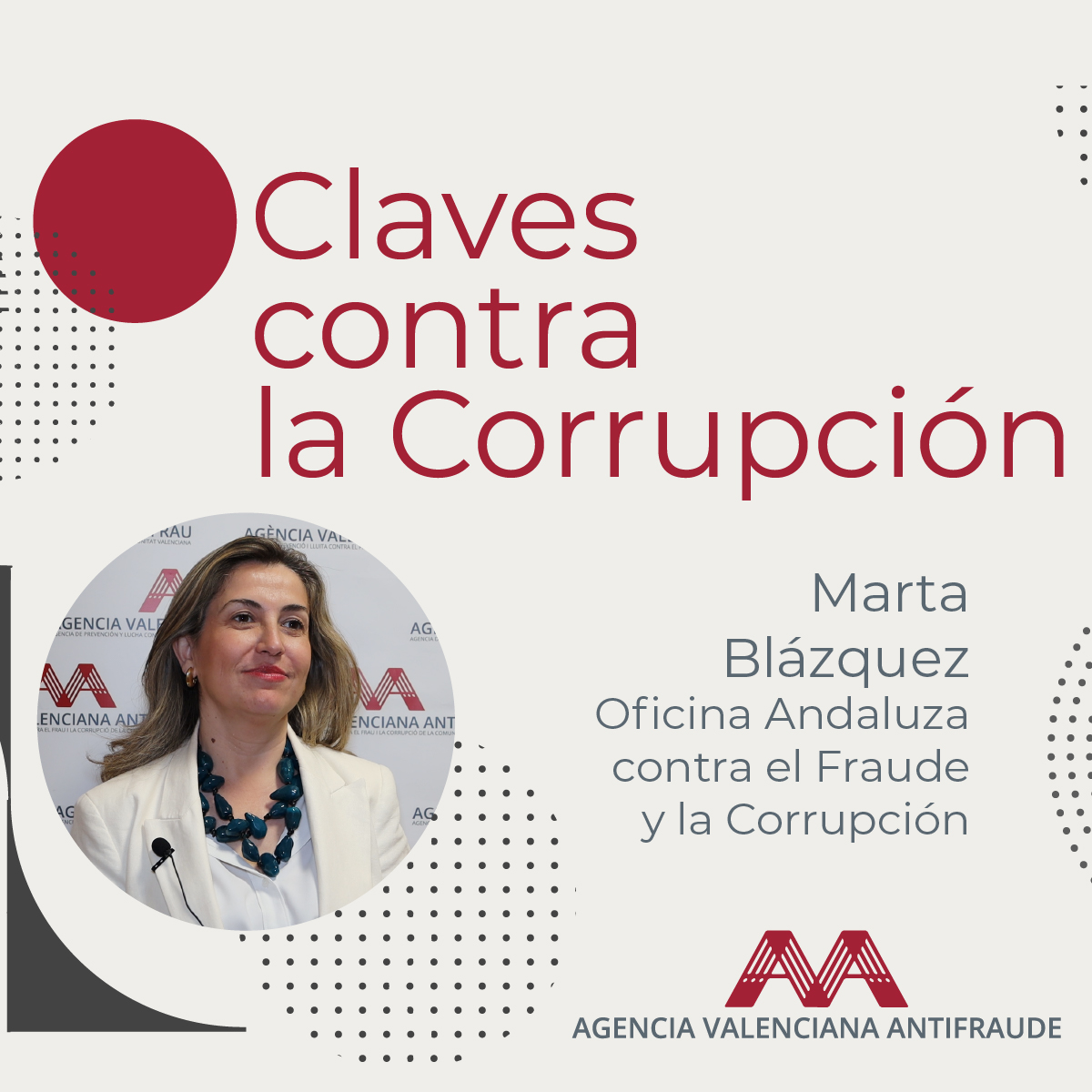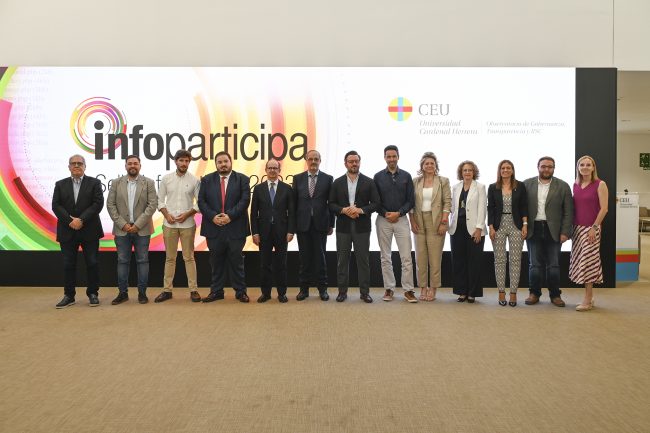The Agency participates in the delivery of the Infoparticipa 2023 Awards of the Observatory of Governance, Transparency and CSR of the CEU UCH University
València, June 5, 2024.- The CEU Cardenal Herrera University (CEU UCH) presented the Infoparticipa Seals for transparency and participation in local public communication in the Valencian Community, corresponding to the year 2023.
The city councils of Onda, València, Elx, Gandia, Dénia, Santa Pola and Rafelbunyol and the three Provincial Councils of Alicante, Valencia and Castellón have complied during the last year with the indicators required for the granting of these transparency recognitions, applying the methodology of the Infoparticipa Map.
The rector of the CEU UCH University, Higinio Marín, the general director of Transparency and Participation of the Generalitat Valenciana, José Salvador Tárrega, and the acting director of the Valencian Antifrau Agency, Anselm Bodoque, presided over the ceremony and delivery of the Seals, in the Auditorium of the University.
The Infoparticipa Seals are awarded in the Valencian Community by the Observatory of Governance, Transparency and CSR of the CEU UCH, together with the ComSET Research Group (Sound, Strategic Communication and Transparency) of the Universitat Autònoma de Barcelona (UAB), following the methodology of the Infoparticipa Map. It integrates the results of the analysis of 52 indicators of transparency and participation on the websites of the 542 city councils and the three provincial councils of the Valencian Community, analysed by researchers from this Observatory of the CEU UCH, for the sixth consecutive year.
On behalf of the three provincial entities recognized in this edition, the Infopartipa 2023 Seals have been collected at the headquarters of the CEU UCH University, the provincial deputy for Transparency and Printing of the Provincial Council of Alicante, Cristina García Garri; the Deputy Delegate for Open Government and Institutional Integrity of the Provincial Council of Valencia, Amparo Folgado Tonga; and the Provincial Deputy for Participation, Transparency and Youth of the Provincial Council of Castellón, María Tormo Casañ.
On behalf of the municipalities distinguished with the Inforparticipa Seal, the awards were collected by Juan Carlos Caballero, Councillor for Transparency, Information and Defence of Citizenship of the Valencia City Council; Vicente Bou Montoliu, Deputy Mayor of the City Council of Onda; the mayor of Rafelbunyol, Fran López; the head of the Informatics and Communications Area of the City of Gandia; Iván Parreño; the mayor of Elx, Pablo Ruz; the mayor of Dénia, Vicent Grimalt; and the councillor of the City Council of Santa Pola, José Pedro Martínez González, responsible, among others, for the area of Transparency.
37 mentions to promote transparency
In this edition, the Observatory of Governance, Transparency and CSR of the CEU UCH has also awarded mentions to 37 municipalities in the Valencian Community with high compliance figures in the indicators analysed with the Infoparticipa Map methodology: more than 50% compliance in municipalities with more than 50,000 inhabitants; more than 40 per cent in municipalities with between 10,000 and 50,000 inhabitants; and more than 30% in municipalities with fewer than 10,000 inhabitants.
The municipalities recognised with this mention are those of Castellón de la Plana, Alcoi, Vila Joiosa, Gata de Gorgos, Callosa de Segura, Xirivella, Peñíscola, Aldaia, La Vall d’uixó, Alaquàs, Borriana, Benicarló, Ribarroja, La Pobla de Vallbona, Alfafar, Petrer, Crevillent, Mutxamel, Picassent, El Puig de Santa María, Muro d’Alcoi, L’Olleria, Alcalà de Xivert, Agullent, Alboraya, Almenara, Burjassot, Catarroja, Algemesí, Ontinyent, Vinaròs, Godella, Moncada, Segorbe and Enguera.
Multi-disciplinary research team
In this sixth edition, with the collaboration of Marta Corcoy, from the UAB, the researchers from the areas of Communication, Political Science and Business of the CEU UCH Hugo Aznar, Elena Juaristi, Blanca Nicasio, María Pilar Paricio, Elvira Alonso, María Pilar García Alcover, María Puchalt, Teresa Bruno and María Isabel Brun, have participated in the Infoparticipa analysis, with the collaboration of Marta Corcoy, from the UAB. together with Leyre Burguera, from the UNED, and Katia Esteve, from the University of Alicante, and with the collaboration of the researchers in training Mercedes Blanes and María Millano.
This analysis of transparency indicators on the websites of Valencian local entities, carried out annually by researchers from the CEU UCH University, is part of the R+D+i Project of the Ministry of Science, Innovation and Universities entitled “Ethics and Self-regulation of Social Communication: Content analysis of the 2nd Generation Codes of Ethics and preparation of Protocols and Guides for their implementation CETICOM-2G” (Ref. PID2021-124969NB-I00).




